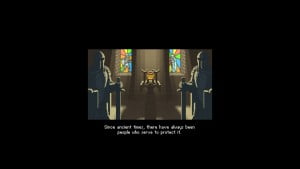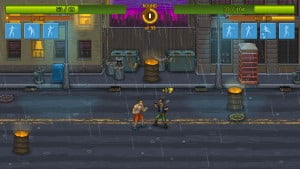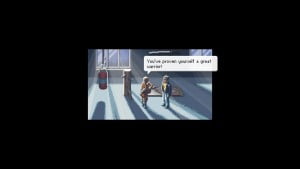Punch Club is an interesting game. It’s about fighting and martial arts sports but it’s not a fighting game or any game that requires quick reflexes or well-timed button inputs. Instead Fight Club decides to take a more strategic approach to fighting and more importantly the training that’s involved with these kind of sports. It gives Punch Club an interesting perspective of a style that’s usually associated with skill and reflexes.
I will avenge my father’s murder.
Punch Club’s story is a simple one. The game starts off with you as a little kid seeing your father get murdered in cold blood on the streets. Years pass and you decide to become stronger and find out who your father’s killer is. After getting in a fight with some thugs, a man named Mick sees potential in you becoming the world champion of an unspecific fighting sport. The game doesn’t really bother to make an interesting story and rather focuses on references and jokes it can make based on popular mediums that use boxing or fighting as its main plot. The game is filled with nods to things like the Rocky movies, Double Dragon and even Teenage Mutant Ninja Turtles. The game doesn’t care at all about the story and instead just wants to make some fun characters all of which are based on character tropes for better or worse. Punch Club shouldn’t be played for its story but rather for its gameplay. That being said, there is no excuse as to how flaccid, lackluster and abrupt the ending is.
 The story is nothing special bt the cutscenes look really nice.
The story is nothing special bt the cutscenes look really nice.
A very passive experience.
Punch Club might look like a beat em’ up or a fighting game but in all actuality Punch Club is a management game. The player controls a unnamed fighter who they will have to maintain. In order for your fighter to do good in fights, you will need to train them in three different skills. Strength, stamina and agility are the three main stats in the game. The player can train these stats by working out at home or in the gym. Training can’t be done forever since your fighter needs sleep and food in order to train. Food costs money which you have to earn working and sleeping makes time pass without earning money or working out. On top of all that at the end of the day your fighter will lose a certain amount of points they gained in training. Here is where the games management shines there is a delicate balance that needs to be kept in order for your fighter to actually improve. Players can buy workout gear for at home so they don’t have to pay to train at the gym and as soon as other jobs arise you will be able to buy potions which temporarily increase stats or more expensive food which fills your hunger gauge more. There is a clear sense of progression and seeing your house become your personal gym or being able to buy more stuff is a satisfying feeling that could be compared to grinding to a certain level or equipping the right gear to fight a boss you lost to multiple times to now beat him with much less effort. The grind is basically what the entire game is made of but Lazy Bear Studios manages to almost hit that perfect pacing. Sometimes the game can tend to take a while certainly since everything is very passive but most of the time it moves fluently and never really manages to feel like a drag. Combat is also a very passive activity instead of selecting which attack to do when you only select skills at the beginning of each round and just watch them play out. The fun in the combat is not the actual combat but rather seeing your fighter improve in skill by the training you do. Again as mentioned before the feeling of finally beating a hard boss and seeing your character get stronger is the main appeal of this game and that it does well.
 The fighting is all controlled automatically but seeing the action is fairly rewarding itself.
The fighting is all controlled automatically but seeing the action is fairly rewarding itself.
Colorful and neatly done.
The game uses pixel art very reminiscent of SNES games. Everything is colorful and the art itself is simple and looks really nice. Everything is visually so appealing and there is never a part where you don’t know what you are looking at. The little cut scenes look really good and use some amazing pixel-art. The music is enjoyable and while there is little music every chip-tune piece fits the art design perfectly. Punch Club doesn’t necessarily advertise itself as a pixel art game akin to the days of yore but it does just that better than most games that use this gimmick as a crutch to sell their game.
 The sprite work and colors look great and the colors are really vibrant.
The sprite work and colors look great and the colors are really vibrant.
| The good: | The bad: |
| +the feeling of progression | -The on the nose references |
| +the colors and visuals | – the ending |
| +nice pacing |
Punch Club is a game for people who like Tycoon or management games more than people who like fighting games. Its actual interaction is minimal and yet it manages to be engaging. The feeling of progression in your character is a major factor as to why it’s so enjoyable. The story isn’t anything special and the characters are all tropes that originate from movies, games and books all based on fighting. The references can be fun for some and sigh-inducing for others due to them being on the nose. No game like this should try to parody Tyler Durden as it will only come over as forced. The ending is abrupt and really comes out of the left field. The game nails the aesthetics and music it was going for without feeling like just another generic pixel-art indie game. Punch Club is a fun game that anyone who like managing things will enjoy themselves with.
3.5 out of 5:



